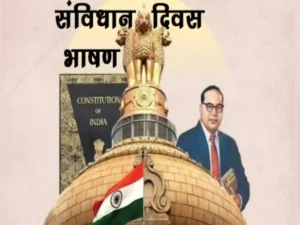In India, November 26 is Constitution Day, also known as Samvidhan Divas or National Law Day. It honours the day the Indian Constitution Day was ratified by the Constituent Assembly and became operative on January 26, 1950. In an effort to increase public awareness of constitutional values, the Ministry of Social Justice and Empowerment designated November 26, 2015, as Constitution Day. This move was made in recognition of the importance of this day.
rights that every person should be aware of

Right to Equality: Under the Indian Constitution, everyone is guaranteed equal protection under the law and equality before the law.
Right to Freedom: The Indian Constitution grants its citizens the freedom to use their speech and expression, to peacefully assemble, to form associations or unions, to travel freely throughout its territory, to live and settle anywhere in the nation, and to engage in any kind of employment, trade, or business.
Right Against Exploitation: The Constitution forbids certain activities, including forced labour and human trafficking, and violations are illegal offences.
Right to Religious Freedom: Every person has the freedom to freely profess, practise, and spread their religion, as well as the right to freedom of conscience. In addition, they possess the authority to oversee religious matters and create and uphold establishments serving both philanthropic and religious objectives.
Right to Life: The rights to life and personal liberty provide protection from disproportionate punishment. Nobody may be punished more severely than the law permitted at the time of the offence.
Cultural and Educational Rights: The preservation of one’s own language, script, or culture is a right for certain groups of citizens. Minorities have the right to create and run educational institutions without facing discrimination on the basis of their language or religion.

Right to Constitutional Remedies: All fundamental rights are guaranteed to be enforced by means of Article 32. These rights are deemed to be protected by the Supreme Court, which also has the authority to grant writs to enforce them.
Right to Privacy: Preserved as an essential component of the rights to life and personal freedom, the right to privacy protects people from intervention by state and non-state entities and permits them to make independent decisions about their lives.
Right to Free Legal Aid: The right to free legal aid is guaranteed by Section 39A of the Indian Constitution, which aims to provide access to justice for those who cannot afford legal representation.
Right to File a First Information Report (FIR): No police officer is permitted to refuse to register a First Information Report (FIR) that a citizen of India files at a police station. Section 166 of the Indian Penal Code, which deals with the penalties for a “public servant disobeying the law with the intent to cause injury to any person,” protects this right. This legal clause guarantees that any police officer who declines to file a formal complaint will be subject to fines, imprisonment for up to a year, or both.
Right to Information: Every Indian citizen is endowed with the priceless right to request information from any public authority under the terms of the Right to Information Act (RTI Act). This includes a wide range of specifics, including government activities, policies, actions and decisions.
One of the most important and fundamental laws in Constitution Day that every Indian should be aware of is the Police Act, which emphasises that police officers are never off duty. The Important Police Act of 1861 serves as the foundation for this claim.
Maternity Benefit Act: A pregnant woman is expressly protected from termination under Section 4 of the Maternity Benefit Act of 1961. This legal clause guarantees that a pregnant woman cannot be fired from her job by her boss or employer.
Gas Cylinder Rules (2004) and Explosives Act (1884): These two important pieces of legislation provide important guidelines. According to these regulations, people can receive insurance up to Rs. 40 lakhs in the event of an explosion, which will help with medical costs and property damage.
Consumer Protection Act: Customers in India may file a complaint under the 1956 Consumer Protection Act against retailers who charge more than the Maximum Retail Price (MRP). The Legal Metrology Act of 2009, which penalises retailers found to have sold goods for more than the MRP, enhances consumer protection even further.
Code of Criminal Procedure Section 46(4): This section of the 1973 Code of Criminal Procedure clearly prohibits any male police officer from making an arrest of a woman after dusk and before dawn. The law stipulates that only female police officers are authorised to make an arrest of a woman during these hours.







